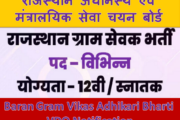“`html
Providing Only 10,000 Jobs: Is This Social Injustice?
Author: [Your Name] | Date: [Insert Date]
The Landscape of Employment in Tamil Nadu
The topic of employment generation has long been a critical issue in Tamil Nadu, especially amidst the growing number of educated youth seeking stable opportunities. Recently, PMK founder Dr. S. Ramadoss has reignited this debate by labeling the provision of only 10,000 jobs by the current DMK government as “social injustice.” His remarks, reported in DT Next (source), underscore widespread discontent over unfulfilled electoral promises surrounding employment and job creation.
DMK’s Promises: Numbers That Fall Short?
During its electoral campaign, the DMK made ambitious commitments to create 2 lakh (200,000) new jobs and fill 3.5 lakh (350,000) vacant posts in the government sector. However, as Dr. Ramadoss pointed out, the government has only managed to provide 40,000 jobs since coming to power. According to him, among these, merely around 10,000 were permanent positions, with the majority being contract-based roles.
Ramadoss framed the lower-than-expected job creation as a significant failure, especially considering Tamil Nadu’s burgeoning unemployed youth population, which includes both skilled and unskilled workers. He asserted that not following through on employment-related promises constitutes a breach of trust and a form of social injustice, given the expectations set prior to the elections (source).
Understanding the Gap: Government Challenges or Policy Decisions?
The discrepancy between promises and results raises pertinent questions: What is causing the shortfall? Is it due to economic constraints, bureaucratic inefficiencies, or a lack of political will? Economic indicators show that Tamil Nadu remains a high-GDP state in India, which suggests that resource availability may not be the most significant barrier.
- Bureaucratic challenges: Streamlining recruitment in the public sector remains a time-consuming process.
- Fiscal priorities: Possible budgetary allocations elsewhere could limit the focus on employment programs.
- Evolving policy focus: Governments might shift focus toward initiatives like privatization or promoting entrepreneurship instead of direct job creation.
However, critics argue that the fundamental issue lies in the inadequate prioritization of youth welfare and sustainable job policies.
Why Job Creation Matters More Than Ever
Job creation is a cornerstone of societal stability and economic equality. For India—and Tamil Nadu, in particular—addressing unemployment is vital due to significant demographic pressures, with a large segment of the population being young and employable. Furthermore, secure employment opportunities contribute to reducing income disparity, enhancing life quality, and, ultimately, fostering trust in governance systems.
Failing to deliver on these promises risks alienating the youth and further widening societal gaps.
What Needs to Change?
To rebuild trust and fulfill commitments to job-seekers, several measures need to be taken:
- Accelerate public sector recruitment processes to fill existing vacancies promptly.
- Promote skill-based training tailored to industries that show growth potential in Tamil Nadu.
- Introduce accountability mechanisms to track and transparently report employment-related deliverables.
- Strengthen public-private partnerships to create new avenues of employment.
By integrating these strategies, governments can not only meet their own goals but also respond to the real needs of their constituents.
“`
### Key Takeaways:
1. Dr. Ramadoss criticized the Tamil Nadu government for creating only 10,000 permanent jobs, calling it “social injustice.”
2. The DMK government had promised 2 lakh new jobs and 3.5 lakh filled vacancies but has only achieved 40,000 total jobs.
3. Delayed recruitment processes, resource allocation, and policy focus shifts may contribute to the shortfall.
4. Job creation is essential to address unemployment, reduce inequality, and improve youth welfare in Tamil Nadu.
5. Suggested reforms include quick recruitment processes, tailored skill training, and increased transparency in meeting job-related promises.
This article provides essential context to job-seekers in Tamil Nadu, helping them understand the current employment challenges and the potential avenues for advocacy. Refer back to the original article (here) for further details.


